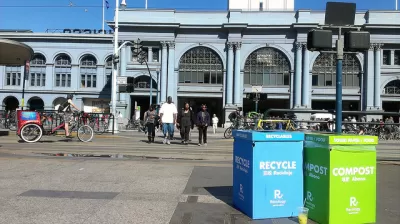In an effort to address climate change, San Francisco has a plan to get residents and businesses to do more than just recycle and compost.

Recycling and composting have long been a part of life in San Francisco. Now the city is leading the way with a no-waste initiative. It is asking other cities to join it in a commitment to decrease the amount of all waste and recyclables by 15 percent and the amount of material going to landfills by 50 percent by 2030.
To push beyond just recycling and composting, city leaders are coming up with ways to get more materials out of the waste stream. “Residents will have to voluntarily give up some of the stuff they buy, for example, and more pressure will have to be exerted on manufacturers to make things that don’t break down,” reports Kurtis Alexander.
San Francisco is hosting the Global Climate Action Summit, an event bringing together environmental activists and leaders from around the world, starting September 12. The Trump administration’s reversal of policies intended to curb climate change means more efforts are happening at the state and local levels:
Absent federal leadership, organizers of the San Francisco summit expect to roll out initiatives among cities, states and other subnational governments, as well as from businesses, with such climate goals as making buildings more energy efficient, increasing investment in environmentally friendly bonds and generating zero waste.
The city plans to promote its zero-waste initiative at the summit as a way to encourage other cities to reduce methane and energy use.
FULL STORY: S.F. invites world to join in zero-waste initiative

Montreal Mall to Become 6,000 Housing Units
Place Versailles will be transformed into a mixed-use complex over the next 25 years.

Planetizen Federal Action Tracker
A weekly monitor of how Trump’s orders and actions are impacting planners and planning in America.

DARTSpace Platform Streamlines Dallas TOD Application Process
The Dallas transit agency hopes a shorter permitting timeline will boost transit-oriented development around rail stations.

Interactive Map Reveals America's “Shade Deserts”
Launched by UCLA and American Forests to combat heat-related deaths, the tool maps the shade infrastructure for over 360 U.S. cities.

Bicycles and Books — In Sacramento, Libraries Now Offer Both
Adult library card holders can check out e-bikes and e-trikes for up to one week.

Colorado Landfills Emit as Much Pollution as 1M Cars
Landfills are the third-largest source of methane pollution in Colorado, after agriculture and fossil fuel extraction.
Urban Design for Planners 1: Software Tools
This six-course series explores essential urban design concepts using open source software and equips planners with the tools they need to participate fully in the urban design process.
Planning for Universal Design
Learn the tools for implementing Universal Design in planning regulations.
City of Mt Shasta
City of Camden Redevelopment Agency
City of Astoria
Transportation Research & Education Center (TREC) at Portland State University
US High Speed Rail Association
City of Camden Redevelopment Agency
Municipality of Princeton (NJ)


























